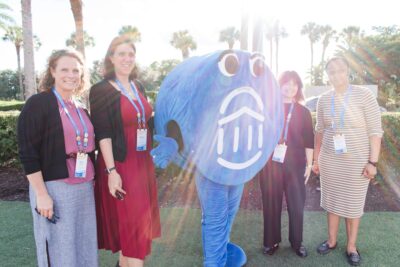3 strategies for leveraging alumni to develop students’ job-ready skills
With 49% of UK hiring decision-makers preferring to see experience from apprenticeships or previous positions on a candidate’s CV rather than a relevant degree, students are increasingly seeking opportunities to build job-ready skills during their degree programmes. Over 90% of U.K. students consider it important that their university provide opportunities for placements, work experience, or internships. Yet only 47% of students successfully undertake a placement or internship during their course, and most students find these opportunities without university help.
Alumni play a crucial role in providing students with opportunities to explore the world of work and can offer students opportunities to build the soft skills that employers expect. Universities should leverage their alumni relationships to provide students with workplace skills they can develop both in and out of the classroom. Read on for three ways institutions across the UK, US, and Canada have helped students build workplace skills by using alumni expertise.
-
90%+
of U.K. students consider it important that their university provide opportunities for placements, work experience, or internships
1. Equipping students with career-readiness skills
While many institutions offer networking engagements or workplace visits, students often feel unprepared for these events and are therefore unable to effectively engage with alumni. Consequently, students leave these networking opportunities with some additional information about various careers, but without having gained any new soft skills (e.g., confidence, or ability to give an ‘elevator pitch’). In response, universities are experimenting with ways to equip students with the soft skills they need, while simultaneously expanding their networks by connecting them with alumni.
At the University of Sheffield, for example, the City Connections Programme organises skills workshops both before and after networking events. At the pre-event workshop, students learn about networking skills and commercial awareness. Then, during the City Connections event, students tour three alumni businesses and participate in an evening reception during which they are expected to apply skills learned in the pre-event workshop to network with successful alumni. After the event, students participate in a post-event skill workshop, receiving advice on following up and articulating their experiences and qualifications with new contacts.
University of Sheffield’s City Connections Programme in brief
-
Pre-Event Skill Workshop
- Students receive tips and training on commercial awareness, networking, and using LinkedIn
- Students learn about the alumni and businesses they will need to ensure preparedness
-
City Connections Event
- Students travel and tour three alumni businesses in London, learning about different roles and potential routes into the organisation
- At evening reception, students apply skills from workshop to network with successful alumni
-
Post-Event Skill Workshop
- Students receive advice on following up with contacts articulating experiences in competency-based questions
- Students complete post-programme evaluation questions (i.e., same as pre-programme questions) to access impact of experience
2. Facilitating workplace experience
While many UK universities offer placements or internships, most do not leverage alumni relationships to source these experiences. Alumni can be a valuable source for facilitating workplace experiences, from lower-intensity mini-consultancies to lengthy internships. By providing students with access to alumni workplaces or projects, students begin learning how to translate their academic work to a job and gain professional skills.
Range of opportunities to embed students in alumni workplaces
-
Low Difficulty
- Student Consultancy Projects
- Case study: Queen Mary University of London
-
Medium Difficulty
- Job Shadowing and Externships
- Case study: The University of Chicago
-
High Difficulty
- Work Placements and Internships
- Case study: University of Birmingham
The least difficult programme to implement is a student consultancy project. For instance, in Queen Mary University of London’s Q-Consult programme, students work in teams on five-week-long mini-consultancy projects for a business or charity client. All projects include research, analysis, and recommendation phases. Many of the clients are sourced through QMUL alums, and student receive pre-project training around consultancy, project management, professional, and presentation skills.
Alternatively, the University of Chicago provides a more intensive job shadowing programme, inviting students to shadow alumni for 1-5 days at their place of work during university breaks. The opportunity gives students a first-hand look at the daily life in their field of interest, a chance to expand their professional network, and to explore possible career paths.
Finally, alumni can be helpful in establishing work placement and internship partnerships. For example, the University of Birmingham developed a relationship with a law firm through an alumnus who is a partner. The firm offers three-month long summer internship opportunities for second- and final-year law students.
These opportunities provide students with workplace skills – professionalism, confidence, time management, and more – whether by inviting students to complete projects for companies, or by embedding the student in a workplace.
3. Leavening the curriculum with real-world experiences
Most frequently, career or student support services spearhead extra-curricular efforts to build student employability. However, these divisions overlook the opportunity to embed skills-building in the curriculum. While more challenging politically, institutions are experimenting with methods to leverage alumni knowledge and expertise to introduce career skills to the classroom. Alumni can provide insight into industry trends, which is particularly useful for market-driven industries like business and engineering. Embedding alumni industry expertise in classroom settings helps students link their studies with real-world applications and industry insights.
Bournemouth University uses ‘course advisory panels’ to bring academic staff and alumni together with the goal of improving the course curriculum. Twenty alumni of Bournemouth’s business programmes share key industry trends with their former lecturers on a biannual basis, keeping academic staff current on industry news, and providing feedback on course curricula. These alumni also serve as industry experts in project-based-learning classes, giving students opportunities to pitch their work and participate in projects dealing with real-life issues.
Snapshot of the Dual Value Bournemouth’s Course Advisory Panels
-
Internal Value
- Networking: Alumni of Business Studies and MBA programme join virtual network of “friends of the programme” upon graduation
- Subject matter expertise: Alumni present on key industry trends bi-annually, keeping academic staff current on industry news
- Workplace practice: Students pitch their work to alumni as industry experts in project-based-learning classes
- Managed internships: Alumni provide students with real-life issues and seek student help with projects
-
External Impacts
- AACSB accreditation body considered the programme a key strength of the school
- Provides bi-annual validation process for curricula in courses heavily dependent on industry practices
- Offers students hands-on experience to add to their resumes
- Easy to recruit alumni due to strong relationships with academic staff
The three strategies outlined above—providing students with the skills they need, giving them the opportunity to practice them in ‘real world’ settings, and helping them find links between their academic work and future career opportunities—can help students be better prepared to enter the working world and attract the interest of future employers.
Ready to explore more strategies to drive student employability by tapping into alumni networks? Read part one of this blog series, or download the full report, highlighting ideas from around the world and featuring data from EAB’s survey of alumni and careers offices in the UK.

More Blogs

Career readiness can’t wait until junior year

Three lessons from 1,200 student success leaders on higher ed’s future
